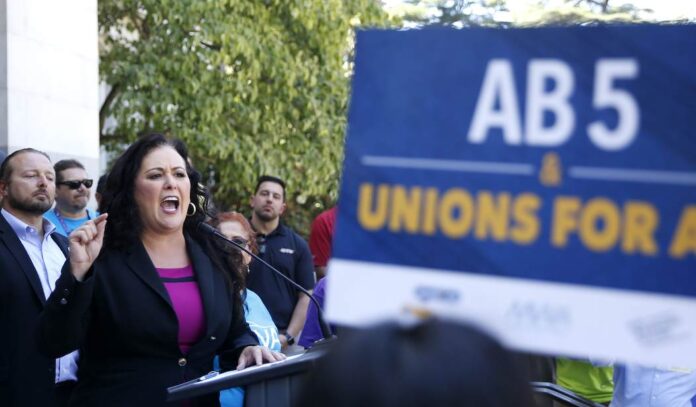In a blow to gig employers like Uber Technologies and Postmates, Inc., on Monday, the Ninth Circuit en banc held that California’s AB5 does not unconstitutionally target the ride-hail and similar app-based companies in violation of the Equal Protection Clause.
This was an about-face from the March 2023 decision by a three-judge panel of the court, which held that the plaintiffs who’d challenged the law “plausibly alleged that AB5, as amended, violated the Equal Protection Clause for those engaged in app-based ride-hailing and delivery services.”
READ MORE: California’s Ninth Circuit Issues Another Body Blow to AB5
Monday’s decision found instead that the California Assembly had rational reasons for treating gig companies differently. See if you can make this make sense:
An 11-judge en banc panel of the US Court of Appeals for the Ninth Circuit on Monday rejected the companies’ contention that a hostile, labor-friendly California Legislature aimed the law known as AB 5 at the gig industry.
Gig companies largely classifies drivers, delivery people, and others as independent contractors who aren’t legally entitled to overtime and other job protections afforded those who are classified as employees.
There are rational reasons for lawmakers to treat apps like Wag!—a service for hiring dog walkers that the companies called “Uber for dogs”—differently than Uber, the appeals court said. They may have viewed Uber and other app-based businesses providing transportation and delivery services as bigger offenders of worker misclassification than those offering other services, the court said.
“The legislature may have perceived Uber as the pioneer of the on-demand app-based business model that many other services replicated,” Judge Jacqueline Nguyen, an Obama appointee, wrote for the court. “It is certainly reasonable for the legislature to try to target the problem of misclassification at its origin.”
In the 27-page opinion, which may be viewed in full below, the court en banc finds that:
There are plausible reasons for treating transportation and delivery referral companies differently from other types of referral companies, particularly where the legislature perceived transportation and delivery companies as the most significant perpetrators of the problem it sought to address—worker misclassification.
The original three-judge panel took note of the allegations in the Plaintiffs’ Second Amended Complaint, which highlighted statements made by then-Assemblywoman Lorena Gonzalez as evidence of personal animus and “singling out” of Plaintiffs in crafting the legislation, thus failing to pass muster under even the low bar of “rational basis review.”
Plaintiffs plausibly allege that their exclusion from wide-ranging exemptions, including for comparable app-based gig companies, can be attributed to animus rather than reason. In the Second Amended Complaint, Plaintiffs cited reporting by the Los Angeles Times that after the passage of A.B. 5 (but before the passage of A.B. 2257), Assemblywoman Gonzalez stated that she is “open to changes in the bill next year, including an exemption for musicians–but not for app-based ride-hailing and delivery giants.” Roosevelt, New Labor Laws (emphasis added). As further noted in the Second Amended Complaint, this statement by Assemblywoman Gonzalez followed numerous other comments “repeatedly disparag[ing]” Plaintiffs. We are persuaded that these allegations plausibly state a claim that the “singling out” of Plaintiffs effectuated by A.B. 5, as amended, “fails to meet the relatively easy standard of rational basis review.”
RELATED:
How Unions, Journalists, Academics, and Legislators Are Colluding to Intimidate AB5 Opponents
California’s AB 5 Is a Sleeping Socialist Threat in Neighboring Nevada
But the en banc court essentially waved that away:
Finally, Plaintiffs argue that A.B. 5 was motivated by impermissible animus and political favoritism. Because we have identified plausible legitimate purposes motivating A.B. 5 and the lines it draws between workers in different industries and occupations, we need not further address these arguments.
One presumes the Plaintiffs will appeal Monday’s ruling to the U.S. Supreme Court, which could (if it’s taken up) mean an interesting decision in the next term from the nation’s highest court on the gig-economy-gutting legislation.




